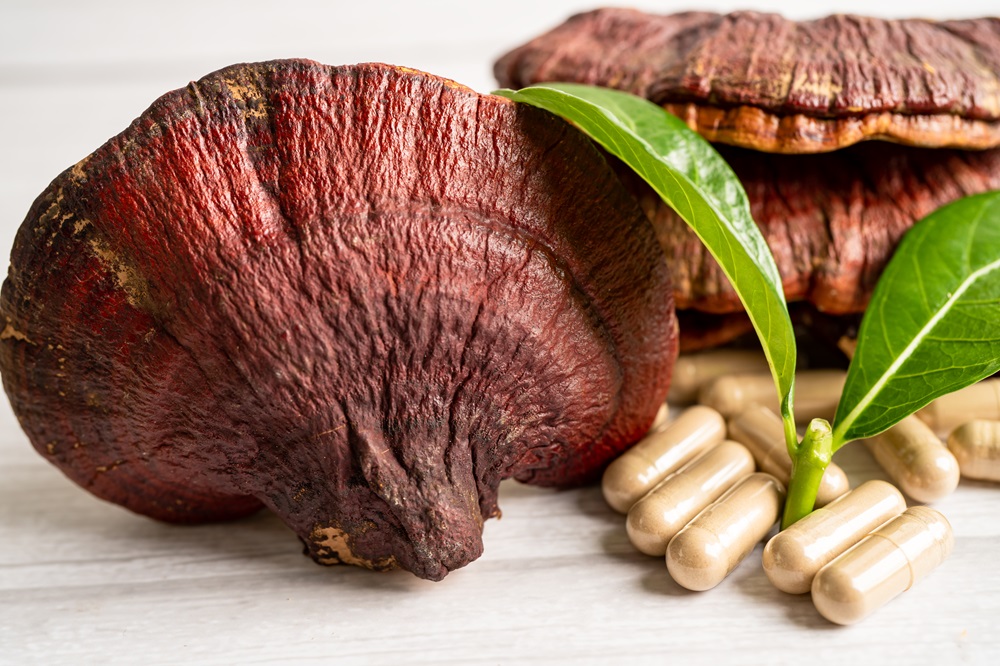Reishi – Effects, Properties, and Uses of Ganoderma lucidum

Reishi is a mushroom rich in valuable nutrients that may offer a variety of beneficial properties - lingzhi may support the immune system, act as an antioxidant, and help increase the body’s resistance to stress factors. This microorganism, well-known and widely used in traditional Chinese culture, is gaining increasing popularity in other parts of the world as well. Reishi mushroom properties - how does lingzhi work? Reishi - how long should you take it? Is it worth using dietary supplements containing reishi?
Table of contents
Reishi - what is it?
Reishi (Ganoderma lucidum) is a mushroom from the Ganodermataceae family, also known as lingzhi, the “divine mushroom of immortality.” In Poland, it is sometimes called the lacquered polypore. Reishi mushrooms occur in six varieties – red, white, blue, purple, yellow, and black – with the red variety being the best studied and containing the highest levels of beneficial compounds.
Ganoderma lucidum has a semicircular or fan-like shape with a shiny, lacquered surface. Lingzhi can be found on almost every continent, but it occurs relatively rarely in nature. It grows mainly in the mountainous regions of China and Japan, while cultivated forms are also grown in Korea, Taiwan, and the USA.
Lingzhi is most often found in damp, shaded areas with high temperatures. As a parasitic fungus that frequently grows on dead tree trunks, it thrives best on deciduous trees, where it develops its mycelium. The mushroom has a bitter taste and is not recommended for raw consumption.
Lingzhi mushroom - composition
Reishi has been known and used in traditional Chinese culture for thousands of years. In the past, it was believed to have magical properties, and even today, talismans made from the mushroom are thought to protect against illness and serve as a source of spiritual power.
Outside Asia, lingzhi was recognized relatively recently. Its valuable properties were noted only in the 1970s. Studies indicate that reishi may contain over 400 beneficial compounds, including:
- polysaccharides
- minerals such as magnesium, manganese, zinc, and copper
- amino acids
- B vitamins
- sterols
- triterpenoids
- beta-glucans
- alkaloids
Reishi - properties
Ganoderma lucidum is considered an adaptogenic mushroom, potentially helping the body maintain homeostasis, improving resistance to stress factors, and stabilizing physiological processes. It may also act as an antioxidant, reducing oxidative stress, neutralizing free radicals and reactive oxygen species, and slowing cellular aging.
Research suggests that reishi may have a positive impact on the immune system. Lingzhi may improve lymphocyte function, activate NK cells, and support leukocytes, contributing to an increase in white blood cell count.
Scientific studies also indicate that lingzhi may support the nervous system, reduce fatigue, improve mood, and decrease anxiety, thus positively affecting quality of life. Additionally, reishi may support cardiovascular health and is increasingly used in the prevention of heart and vascular diseases. It may lower triglyceride levels and increase HDL cholesterol. Data also suggests that Ganoderma lucidum may lower blood sugar levels by inhibiting the enzyme involved in glucose production. Furthermore, it may help reduce blood pressure and have anti-platelet effects.
Preliminary research shows that reishi may have antibacterial, antiviral, and antifungal potential, as well as anti-inflammatory and hepatoprotective effects. It may also benefit skin health by moisturizing, soothing, brightening, and supporting skin regeneration.
Although reishi mushrooms are gaining popularity worldwide and are associated with numerous potential benefits, many of these properties still require confirmation through scientific studies. More research is needed to fully understand the potential advantages of using Ganoderma lucidum.
Reishi mushrooms - dietary supplements
Reishi is available on the market in various forms, most commonly as reishi powder or in capsules and tablets. You can also find reishi coffee and lingzhi tea.
Dietary supplements with reishi may be made from different parts of the mushroom, such as the mycelium or spores of Ganoderma lucidum. When choosing a product, it is worth checking whether it is standardized and selecting one with a clearly indicated content of key compounds, such as polysaccharides, along with the DER ratio (Drug Extract Ratio), which specifies the amount of raw plant material used per amount of final product.
Reishi mushrooms - how to use?
The recommended dose of a reishi supplement depends on the purpose and the form of the product. Doses of around 500–600 mg of mushroom extract may provide health benefits, although higher amounts are sometimes suggested.
How long should you take lingzhi? It is generally advised to take reishi for up to 4 weeks, followed by a break of at least 1–2 weeks. Current scientific research mainly focuses on short-term reishi use, so more studies are needed to determine the long-term effects and safety of lingzhi consumption.
Reishi mushrooms - side effectsObservations indicate that side effects are most often linked to excessive intake or improper use of reishi supplements. Possible symptoms include headaches, dizziness, rash and itching, nausea, diarrhea, heartburn, or vomiting. Long-term overuse may increase the risk of liver damage.These adverse effects should subside after discontinuing reishi consumption.Reishi mushroom - contraindications
Although Ganoderma lucidum may offer several benefits, reishi should not be used by certain individuals, including those taking immunosuppressants, anticoagulants, or blood-thinning medications, as well as those in recovery after illness. Lingzhi is also not recommended before planned surgery, as it may increase the risk of bleeding.
People with cardiovascular conditions such as hypertension, or with liver or kidney disorders, should be especially cautious and consult their doctor before starting supplementation with reishi-containing products.

